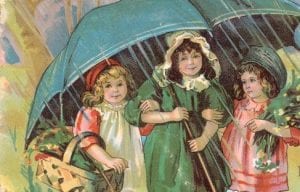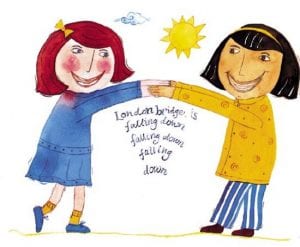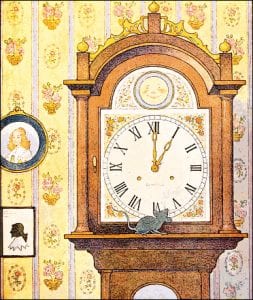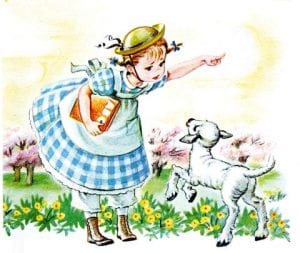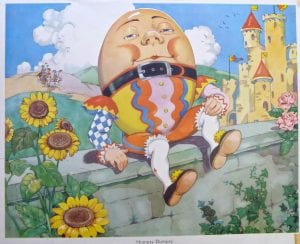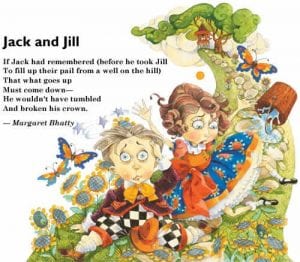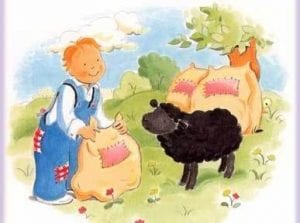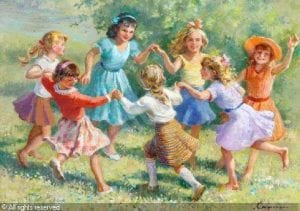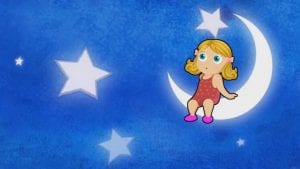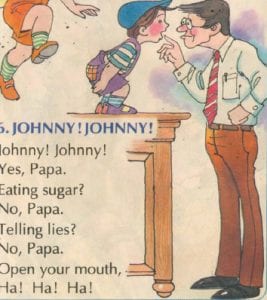I dropped by my neighbor’s house and heard her little daughter dancing in front of her computer to all too familiar nursery rhymes. It took me some time to realize I was chanting the rhymes with my 3-year-old companion without a hiccup. It was like hardly any time had passed since I learned them myself. Even after so many years, I remembered every single rhyme I had ever learned. I found myself reminiscing about those times when my biggest concern was having to perform these very rhymes to the countless guests visiting us at my parents’ behest. Ah, the good old days! Let’s revisit some rhymes from that golden era, shall we? Here is my pick of the most beloved rhymes ever!
10. Rain rain go away
Rain, Rain,
Go away;
Come again,
Another day;
Little Johnny wants to play.
The original version of this rhyme has an additional two lines:
Rain, rain, go to Spain,
Never show your face again!
It can be dated back to Queen Elizabeth’s reign when there was intense rivalry between Britain and Spain. The rhyme we learned in kindergarten though describes a boy’s yearning for clear skies so he can continue playing. Though popular this rhyme may not necessarily be applicable to countries like India where everyone is yearning for quite the reverse!
9. London Bridge is falling down
London Bridge is falling down,
Falling down, falling down.
London Bridge is falling down,
My fair lady.
The catchy tune and easy to understand lyrics makes it a popular choice among children. It relays the history of the London Bridge since its conception during the Roman occupation of England. Through its simple lyrics we can track the various transformations the bridge underwent due to practical difficulties through the years. For many it brings back memories of the game we played as kids holding hands in an arch while others ran under them and catching a player at the end of the song!
8. Hickory Dickory Dock
Hickory, dickory, dock.
The mouse ran up the clock.
The clock struck one,
The mouse ran down,
Hickory, dickory, dock.
This rhyme meant to introduce children to the act of reading the time on a clock may have started out as a rhyme to help count. It is known that shepherds in Westmorland, England used the numbers Hevera (8), Devera (9) and Dick (10) for counting. Sound familiar? Yes, it sounds very similar to the first three words of the rhyme, doesn’t it? An opposing theory though states that the rhyme may have originated from America due to the meaning of the words used in the rhyme. The word Hickory may refer to Hickory nuts from which oily milk-like liquor is derived. Either way this rhyme has been recited by several generations of kids now which is why it has made its way into this list.
7. Mary had a little lamb
Mary had a little lamb,
Little lamb, little lamb,
Mary had a little lamb,
Its fleece was white as snow.
And everywhere that Mary went,
Mary went, Mary went,
Everywhere that Mary went,
The lamb was sure to go.
The words to this rhyme were actually inspired by a real life incident. One day little Mary Sawyer decided to take her lamb to school on her brother’s suggestion. A young man who happened to be visiting her school that day, inspired by the strange sight of the girl and her lamb, wrote this rhyme. For me though, this sweet little rhyme stirs up a memory of my yearning for a lamb. Ever since I heard this rhyme, I remember longing for a lamb just like Mary’s to take to school!
6. Humpty Dumpty
Humpty Dumpty sat on a wall,
Humpty Dumpty had a great fall.
All the king’s horses and all the king’s men
Couldn’t put Humpty together again.
This popular rhyme which invokes an image of an egg on a wall has many theories surrounding it. The most acknowledged version though would be that Humpty Dumpty was not a person but rather a sturdy canon employed by the Kings forces during the English Civil War of 1642 to 1651. During the war just as it looked like the King’s forces were winning thanks to the canon placed atop a church tower, the tower was blasted off bringing down Humpty Dumpty to its untimely death. And just like the rhyme goes the King’s men tried their best to put together the canon but alas to no avail.
5. Jack and Jill
Jack and Jill went up the hill
To fetch a pail of water;
Jack fell down and broke his crown,
And Jill came tumbling after.
Another popular rhyme, it may have originated in a small village in Somerset. Apparently in 1697, a young unmarried couple did most of their courting up a hill. In time Jill got pregnant but before giving birth to the baby Jack kicked the bucket after getting hit by a rock on the hill, soon after Jill also breathed her last during childbirth. Cheerful isn’t it?
4. Baa Baa Black sheep
Baa, baa, black sheep,
Have you any wool?
Yes, sir, yes, sir,
Three bags full;
One for the master,
And one for the dame,
And one for the little boy
Who lives down the lane.
‘Baa baa black sheep’ is another widely known and loved rhyme that most will remember from kindergarten. Dating back to 1731 what sets it apart is the surprisingly small number of variations that it has undergone over the ages in contrast to its counterparts. But have you ever wondered what this rhyme meant? I mean sure, you’ve understood that a sheep is giving out bags of its wool but why write a rhyme about it right? Well, history tells us that during King Edward’s reign of England he taxed wool, hence the mention of ‘bags of wool’. The master refers to the King, while the dame refers to the Church and the little boy is none other than the poor farmer who is being taxed!
3. Ring-a-ring-a-roses
Ring-a-ring-a-roses,
A pocket full of posies;
Ashes! Ashes!
We all fall down.
Engulfed in nostalgia? Memories of holding hands with your kindergarten buddies chanting the much-loved rhyme, distorting the lyrics with charming lisps and the laughter that fills the air when everyone tumbles down at ‘all fall down’ must flash through your minds. The good old days! But how many of us know that this perfectly harmless rhyme refers to a rather sinister past?
On many occasions, the rhyme has been associated with the Great Plague that broke out in England in 1665. People ailing during the time invariantly underwent excessive spells of sneezing and falling down. This is in congruence with certain versions of the rhyme where Ashes! Ashes! Was replaced by ‘Atishoo atishoo’ akin to someone sneezing. Also, characteristic rosy rashes were another symptom of the Plague, while many carried posies of herbs to ward off the disease, thus further confirming its allusion to the Plague. And the Ashes in the colonial version could very well imply the cremation of the vast populace which succumbed to the disease. But all this is still a matter of debate and has been touted to be nothing more than mere speculation.
2. Twinkle Twinkle little star
Twinkle, twinkle, little star,
How I wonder what you are!
Up above the world so high,
Like a diamond in the sky.
Personally, this is my favorite among the many rhymes I learned in school. It conjures up memories of reciting in front of guests or chanting it with complementary actions in class. Although originally a five-stanza poem only, the first stanza found its way into kindergarten books. Referring to the bright, twinkling stars that come out every night, it is probably the most relatable for most kids.
1. Johnny Johnny yes papa
Johnny Johnny, Yes Papa.
Eating sugar? No Papa.
Telling lies? No Papa.
Open your mouth, ha ha ha!
Do you know there is a possibility this beloved rhyme has its origins in India? I’m not kidding. There has been speculation that the rhyme which has taught countless not to lie could have originated in India. This speculation has been attributed to the accent of the rhyme though many might not agree. Either way, this rhyme is, without doubt, one of the cutest rhymes we learned in school and also much loved among kids, probably because of the ease with which it rolls off their tongues and the happy (ha ha ha) note on which it ends.
Every time you sing a rhyme to the young in the family you are probably mimicking a practice of yore much before these rhymes were chronicled on paper! You carrying out the legacy of our previous generations. You could, every time you recite a rhyme to your daughter or son, be mirroring a mother who sat under the stars and sang one of these very rhymes a few hundred years prior. So, not only are these rhymes so intricately woven into our lives and our past it is also unequivocally entwining our lives with history.

